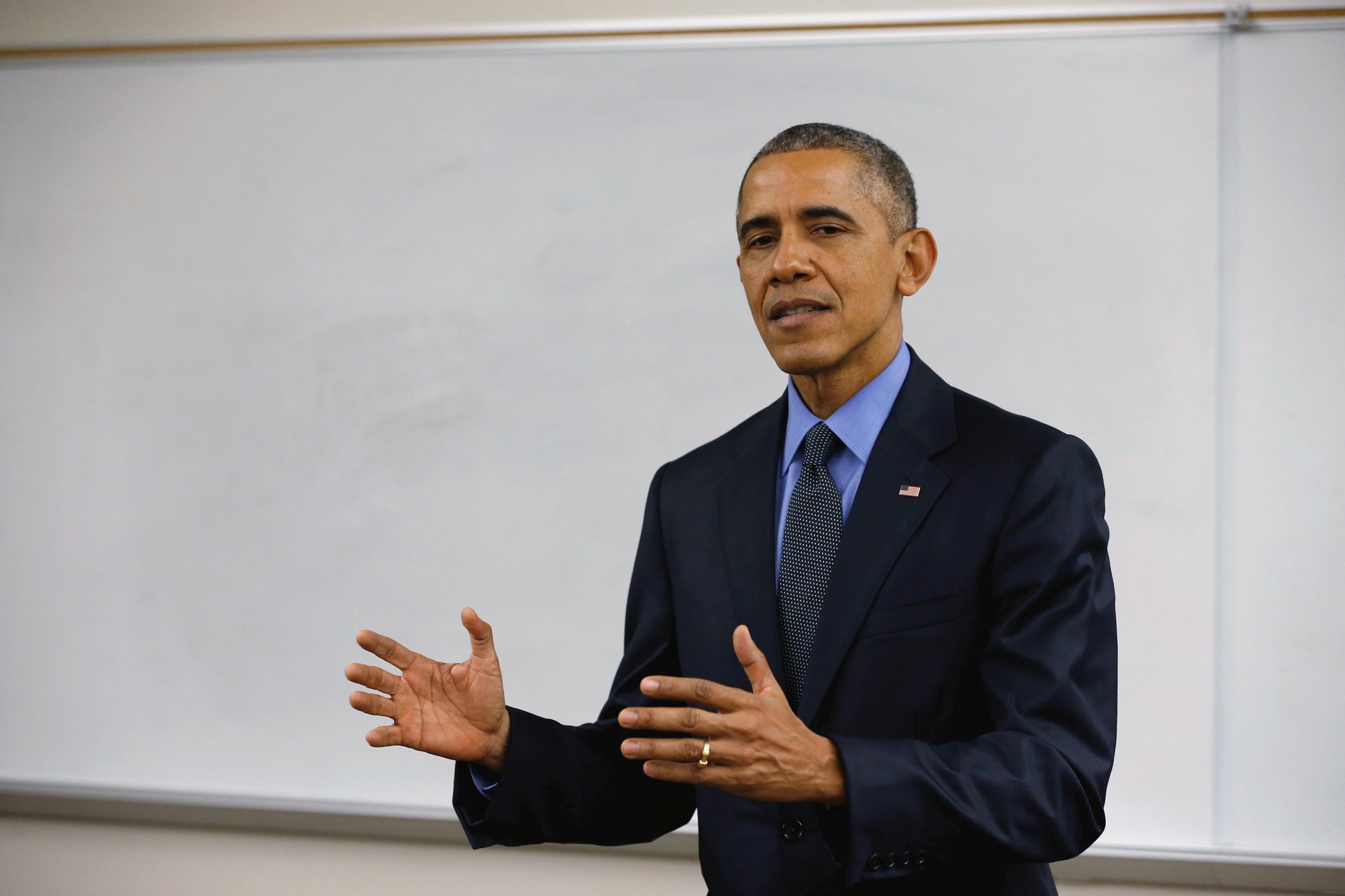
In an interview with NPR aired Monday, President Barack Obama said that Donald Trump, the current front-runner for the Republican presidential nomination, is "exploiting" the economic and cultural stresses faced by "blue-collar men."
"They are no longer getting the same bargain that they got when they were going to a factory and able to support their families on a single paycheck.…You combine those things and it means that there is going to be potential anger, frustration, fear," Obama told Morning Edition's Steve Inskeep.
The remark recalls Obama's infamous "guns and religion" gaffe from 2008, when the then-senator said his struggles with white working-class voters stemmed from an inability to ease the frustration caused by economic insecurity.
"They cling to guns, or religion, or antipathy to people who aren't like them, or anti-immigrant sentiment or anti-trade sentiment as a way to explain their frustrations," Obama said in 2008. Those words seem downright prophetic in the year of "the Donald," who has, among other things, praised Dwight Eisenhower's "Operation Wetback"—which saw law enforcement officials deporting undocumented immigrants en masse in the back of trucks—as a viable immigration solution, and claimed that the U.S. "loses" on every one of its international trade deals.
Obama also told NPR on Monday that globalization, the rise of technology and the 2008 financial crisis all contribute to "anger, frustration [and] fear." These phenomena are often cited as defining trends of the modern American economy. Globalization and technological advances have both contributed to a shift in employment—more factory jobs have gone overseas, and robots have increasingly replaced the middle-class workers who lived comfortably off blue-collar jobs in the previous century.
It's a sociological analysis that deeply differs from Republicans' diagnoses of the country. In recent presidential debates, nearly every GOP candidate has looked to cultural factors such as the changing nature of family units to explain the current atmosphere of frustration and alienation. Obama thinks that economic and material concerns are the root cause.
In the interview on Monday, Obama also said that, in his view, fear explains the public's perception of the administration's campaign against the Islamic State militant group, also known as ISIS or ISIL. Trump has been more critical of Obama's foreign policy than he has been of his economic policy, despite the fact that Trump's credentials as a businessman would seem to lend themselves to the latter. Obama thinks fear of terrorism has swelled beyond reasonable levels.
"If you've been watching television for the last month, all you've been seeing, all you've been hearing about is these guys with masks or black flags who are potentially coming to get you," he said.
When asked if the media is to blame, his response was telling.
"The media is pursuing ratings. This is a legitimate news story…[but] there's no doubt that the actions of ISIL are designed to amplify their power and the threat that they pose. That helps them recruit," he said.
He went on to argue that ISIS does not have the capability to actually destroy the U.S. as a nation. Presidential candidates such as Ted Cruz and Marco Rubio have labeled terrorism an existential, civilizational threat, often comparing the current climate to the Cold War. To Obama, terrorists can threaten a number of lives but not the survival of the country as a whole.
Unfortunately for Obama, the former is what fuels fear. As Christopher Nolan aptly pointed out in The Dark Knight, it's the idea of chaos and violence happening anywhere that produces fear in average citizens—not overseas conflict between nations, even if casualties are high.
Obama's blaming of the media for the amplification of ISIS's message could arguably also apply to Trump, who has turned the national news into his personal stage since rising to the top of the polls this summer.
Despite Obama's criticism of the media, however, his explanation for Trump's popularity mostly echoes pundits. Scores—and that is not an exaggeration—of think pieces and op-eds have discussed, almost always with a negative slant, Trump's appeal to uneducated, blue-collar, white voters through xenophobia, nationalism and reactionary ideology, particularly on immigration and national security.
Uncommon Knowledge
Newsweek is committed to challenging conventional wisdom and finding connections in the search for common ground.
Newsweek is committed to challenging conventional wisdom and finding connections in the search for common ground.
About the writer
Jack Martinez is a writer from Great Falls, Montana. He attended Stanford University, where he studied the Classics and received ... Read more
To read how Newsweek uses AI as a newsroom tool, Click here.





